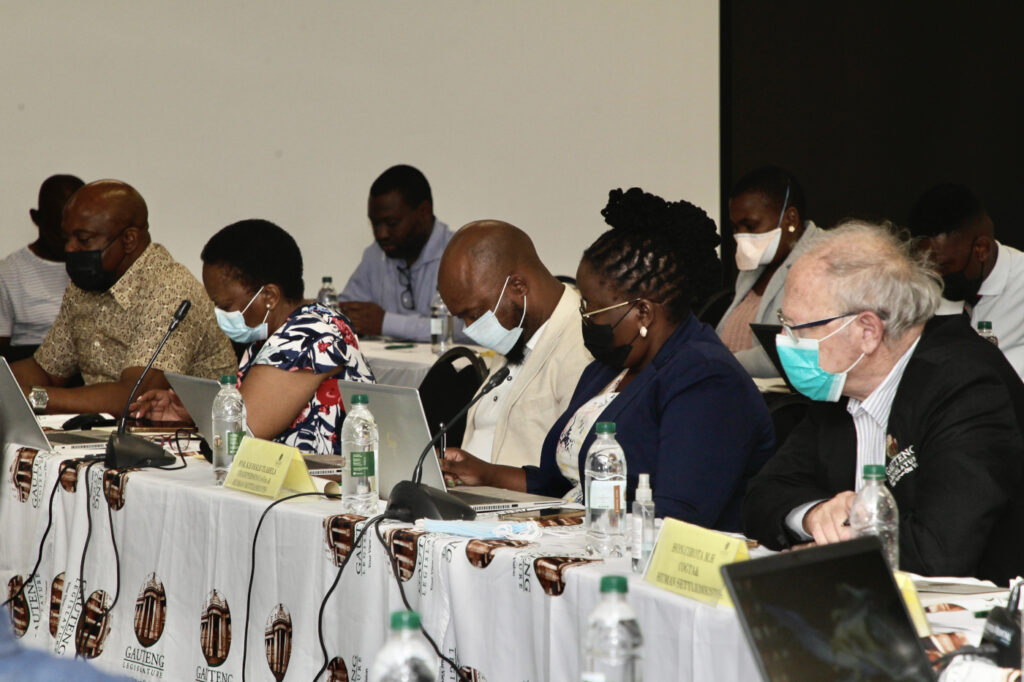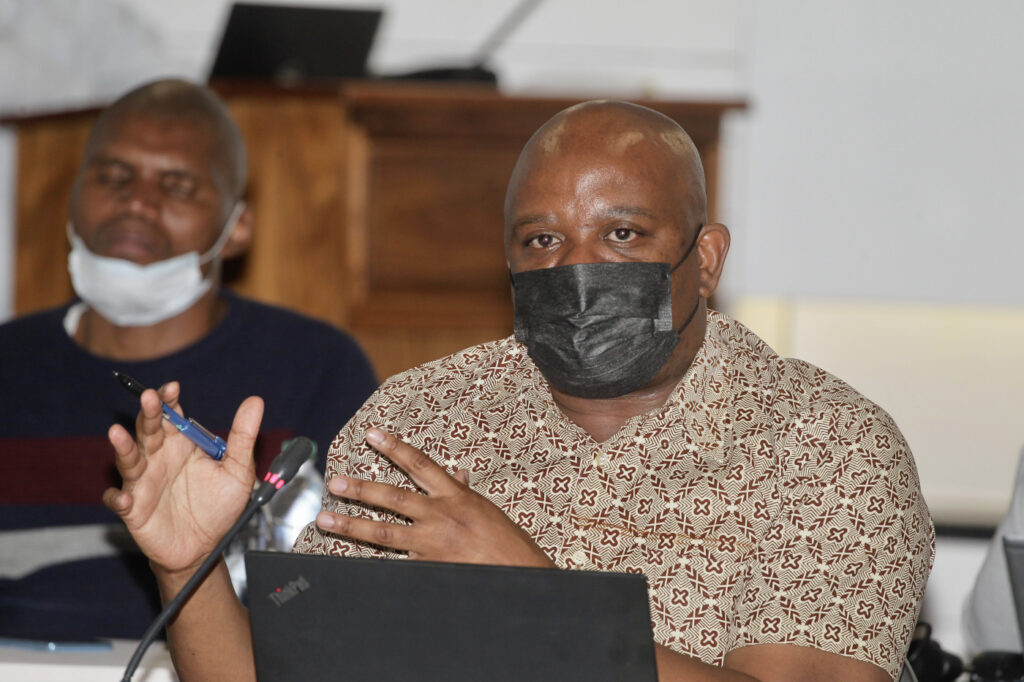Chairperson of the Portfolio Committee, Honourable Kedibone Diale-Tlabela
Gauteng girding itself to address alarming 1.2 million RDP housing backlog
One of the biggest conundrums of post-apartheid South Africa has been the failure by the democratically elected government to resolve the Reconstruction and Development Programme (RDP) housing backlog across the nine provinces.
It is a deep challenge, and there is no taxonomy agreed upon on how to effectively deal with the RDP housing backlog, affecting millions of poor South Africans, particularly those living with disabilities, military veterans, elderly and child-headed households.
It is against this background that the Gauteng Provincial Legislature hosted a seminar on an investigation into the identification process of the housing beneficiaries, and the allocation of RDP houses in the Gauteng province.
The Chief Director of Beneficiary Management for Human Settlements Colin Pitso started the seminar by saying that housing access has been at the helm of post-apartheid delivery mandate of the government, particularly for urbanised provinces like Gauteng.
He said despite the large scale of housing delivery, there was still an estimated backlog of over two million housing units, which is a cause for concern.
Most people are still on the waiting list to receive their houses after registering with the department of housing in 1996 and 1997.
Some of the RDP houses in Gauteng, mainly in Pretoria and surrounding areas, have been left unfinished by building contractors, leaving residents infuriated.
Managing the housing lists has been a daunting challenge for government, and, according to various speakers, officials have also been accused of allocating houses to close relatives, illegal immigrants and members of their political affiliation.
As a result, projects are always delayed because of protests against the people being allocated houses.
Pitso said the Gauteng Department of Human Settlements (GDHS) along with accredited municipalities are currently tasked with the mandate of ensuring progressive provision of adequate housing in the province as outlined in Section 26 (1) and subsection (2) of the South African Constitution (Act No. 108 of 1996).
To deal with the RDP housing backlog, Pitso said the provincial department of human settlements has implemented a Revised Provincial Housing Allocations Policy and Revised Beneficiary Management.
He said from now on, the National Housing Needs Register would be the only official database from which prospective beneficiaries will be drawn.
“Once approved, the beneficiaries will be informed about the approval, the area where they will benefit from and the stand number/erven,” said Pitso.
Pitso stated that housing allocations in Gauteng would now be done in a way that helps and enables the government to deal with delays of allocating houses to qualifying beneficiaries in an effective and efficient manner.
He said the beneficiary shall meet the qualification criteria as set in the National Housing Code, 2009 Integrated Residential Development Programme.
He said this would be done in order to ensure that the housing allocation process was done in a fair, equitable and transparent manner, adding that the top priority would be given to beneficiaries such as pensioners, people with disabilities, military veterans and applicants who have been on the 1996-1999 qualifying waiting list.
The applicants must be South African citizen or be in possession of a permanent residence permit.
Preference would also be made to people living with disabilities, military veterans and those over 60 years of age.
 Members of the Department of Cooperative Governance and Traditional Affairs (COGTA) and the Human Settlements Portfolio Committee
Members of the Department of Cooperative Governance and Traditional Affairs (COGTA) and the Human Settlements Portfolio Committee
“A sound allocations policy should be put in place in order to restore trust deficit between government and communities through the housing delivery value chain,” Pitso said.
“Allocations Policy must reinforce the achievements of developmental outcomes on integration, inclusion and spatial transformation. The department and municipalities also need to work closely together to effectively deliver on the tenets of sustainable human settlements development.”
Mark Napier of the Centre for Scientic and Industrial Research (CSIR) said waiting lists of “beneficiaries” and databases of housing needs are not so effective at matching demand and supply.
“The system is not adaptive to shifting demand such as the pressing need for a lot more rental accommodation in Gauteng,” said Napier.
He said linking houses with beneficiaries early on means a time lag between the application and occupation of the RDP house.
“Allocation processes can be subject to interference at some points, which skews policy intent and distorts the market,” said Napier.
“The promise of being registered in a database can rarely be met. Housing demand data (and backlogs in adequate housing) is being conflated with data about applications for state support (expressed demand), making planning difficult and chasing a receding target.”
He further said the sheer scale and dynamism of demand defies state-dominated housing planning and allocation mechanisms.
“Gauteng is going to necessitate a focus on diversified supply with public and private sectors working in tandem (especially reducing market distortions) to meet growing and dynamic demand,” said Napier.
“The attempt to cater to individual households making claims on the state tends to cause the spatial misallocation of funds (i.e. the spatial allocation of investment following social demands on the state, not to mention catering to local patronage networks) rather than something that builds a balanced portfolio of housing/tenure types across cities and regions that are urbanising fast.”
The South African Human Rights Commission (SAHRC) presented its report on the housing backlog in Gauteng and its various municipalities.
The commission’s report found that municipal maladministration, lack of control and corruption were the main administration-related factors that cause housing challenges and ultimately informal settlements.
The commission said municipalities must take steps to ensure that IDPs and housing allocation databases are transparent and made available to communities regularly, adding that municipalities which do not currently have housing allocation databases should develop such a system to ensure that people have access to information and that housing allocation is done in a transparent manner.
The SAHRC also informed the seminar that it had received numerous complaints relating to housing allocations where persons who were meant to receive houses, have not received the houses because the houses have been occupied by other people.
Of the total complaints received by the SAHRC, 5% of the 5 238 complaints received during the 2014/2015 financial year related specifically to the right of access to adequate housing.
The SAHRC GP office conducted a road show in 2022 where it monitored service delivery issues in Gauteng, particularly the West Rand. Access to adequate housing remains a problem for many communities and this is tied to other socio-economic housing.
“The quality of material used for constructing the RDP houses is usually poor quality material. Reports shows that roofs, walls, doors, floors and windows are mostly poor standard as most are reported to be crumbling, pulling off, breaking without any external influence, but due to poor material and workmanship,” said the Human Rights Commission in its presentation.
 Colin Pitso, Chief Director for Beneficiary Management at the Gauteng Department of Human Settlements
Colin Pitso, Chief Director for Beneficiary Management at the Gauteng Department of Human Settlements
Last month, Health Minister Dr Joe Phaahla said the government was in the process of deploying a digital system to curb corruption in RDP allocation of houses.
The digitisation would ensure that there was transparency and no corruption in the subsidised housing programme, referred to as the “RDP housing programme”.
Phaahla said this was in line with making the public housing allocation process more transparent.
“This will be done through the digital system that is accessible to all, which will eliminate corrupt activities in the allocation of housing opportunities,” said Phaahla.
“We are doing so by reprioritising the programmes to focus on the upgrading of informal settlements, integrated residential development, and significantly increasing the affordable rental housing stock.The department will also accelerate the issuing of title deeds throughout the country as a way of restoring dignity to South Africans.”
Kedibone Diale-Tlabela, Chairperson of the Portfolio Committee on COGTA and Human Settlements, said the RDP housing backlog can be addressed if each and every government official put their shoulder to the wheel.
She urged government officials to start taking the issue of the RDP housing backlog seriously, because it affects the poorest of the poor.
“I am passionate about human settlements and would like to see these issues being addressed. I am challenging all government officials who are here today to start thinking outside the box. Let us implement these policies and achieve results that we have set ourselves to accomplish in this seminar,” said Diale-Tlabela.